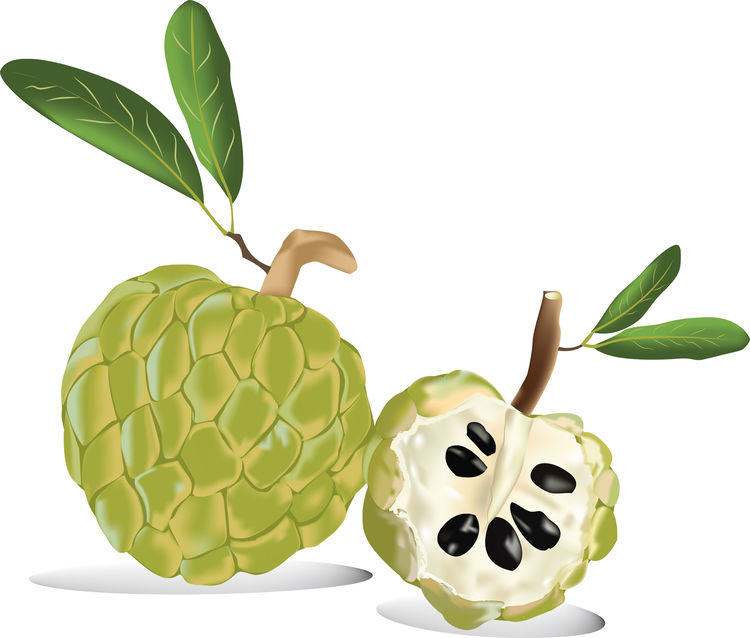What are the health benefits of ramphal fruit? Ramphal has multiple different names across the globe (custard apple, bullocks heart). It is the fruit from a semi-evergreen tree and is light green in colour, bumpy in texture and with a sweet flavour flesh. Some describe the taste as custard combined with cooked apples. This fruit is most commonly grown in India’s regions such as Assam, West Bengal, Gujarat and Maharashtra.

Proposed benefits
- Lowers blood glucose
- Improves acne, frizzy hair and weak joints
- Reduces risk of cardiovascular disease
- Boosts immunity
- Reduces inflammation
- Inhibits formation of kidney stones
- Prevents anaemia
- Reduces muscle cramps
So how much evidence is there for each of the suggested benefits of ramphal fruit?
Lowers blood glucose
- It has been suggested that ramphal has blood lowering glucose properties. If you have type 1 or type 2 diabetes it is important it is to control you blood glucose levels. diabetes.co.uk is one of the world’s largest online diabetes communities. They suggest numerous vitamins and minerals to help control blood glucose levels.
- Diabetics need to aware of which fruits they eat, and the portion size consumed due to the high sugar content of some fruit. Ramphal fruit has a similar to that of an orange. This does not mean you have to avoid fruits altogether as many contain vitamins and minerals needed for a healthy diet.
- Biotin, magnesium and vitamin B6 are said to lower blood glucose levels. However due to minimal levels of these vitamins and minerals present in the Ramphal it is unlikely they would have an impact.
- Ramphal fruits contain 264mg/100g of potassium. Insulin users more likely to be deficient in potassium. Increasing the amount of potassium in the diet may improve the body’s sensitivity to insulin and therefore its effectiveness.
- Ramphal fruit is high in vitamin C and contains 59.54mg/100g (this is more than in an orange). Diabetics often have lower vitamin C levels. It has also been suggested that vitamin C may play a role in improving glucose tolerance in type 2 diabetics.
- Please monitor the effects of any diet modifications carefully and talk to your doctor before introducing any major changes.
Improves acne, frizzy hair and weak joints
- Ramphal fruit is high in vitamin C which is an antioxidant (see our article on this to understand more about antioxidants). Vitamin C is frequently used in dermatology to treat and prevent changes associated with photoaging and hyperpigmentation. However, the optimum dosage and application methods are still under review.
- There is little to no evidence on the effect of vitamin C on reducing the amount of frizz in your hair or improving weak joints.
Reduces risk of cardiovascular disease
- There is very strong evidence that consuming the recommended daily amount vitamin C has positive effects on the body such as improved dilation of blood vessels in people with atherosclerosis, high cholesterol and high blood pressure. Thus, lowering the risk of complications from these conditions.
Boosts immunity
- As Ramphal is high in vitamin C this also means that another benefit is its positive effect on the immune system. Vitamin C supports various cellular functions such phagocytosis (the killing of microbes).
Reduces inflammation
- The effect Ramphal has on reducing inflammation is still a relatively new area of research. There have not been enough studies completed to suggest taking Ramphal would lower levels of inflammation. However, some research has shown that vitamin C may reduce inflammation. We also know that vitamin C is an antioxidant which has the ability to neutralise free radicals which can be a cause of inflammation in the body. Consumption of a fruit so high in vitamin C could have these positive effects.
Inhibits formation of kidney stones
- This proposed benefit of ramphal fruit has conflicting research. Vitamin B6 has been shown in some studies to reduce kidney stones. However, there are not very high levels of vitamin B6 Ramphal.
- On the other hand, there are high levels of vitamin C which is known for increasing your risk of developing kidney stones! As excess vitamin C is excreted as oxalate (a component of kidney stones).
- Based on this evidence I would not suggest consuming Ramphal or any fruits that have too high a vitamin C levels if you have or are at an increased risk of developing kidney stones. Always consult your doctor for advice based upon family history and current medications.
Prevents anaemia
- Ensuring enough iron in your diet is essential to preventing anaemia. Ramphal is not a good source of iron so there is no validity to this claim. Some better sources of iron are red meat, fortified breakfast cereals, leafy green vegetables, beans and nuts.
Reduces muscle cramps
- Muscle cramps are no fun for anyone. They can be caused by a variety of different reasons. One of the main causes is an imbalance of water, sodium and potassium in your body. We all know that bananas are a good source of potassium but so is Ramphal!
How to consume them?
- This fruit is often used to make delicious ice cream, sorbets and smoothies. As with any fruit or vegetable the cooking process often destroys the vitamins, so consuming Ramphal raw would be a better option.
- It can also be used in fruit salad or baked into a pie.
How many to consume?
There was limited research into this, however consumption as part of a balanced diet would most likely lead to the best benefits. Although it is important to remember the natural sugars (fructose) present in fruit and the damage these may do to your teeth. Read our article on sugar consumption for more information.
Conclusion
Overall there are lots of positive benefits to consuming Ramphal, the main one being the high vitamin C content. It’s important to note that although we have discussed the health benefits of the health benefits of vitamin C, you should not consume more than your recommended daily amount as there may be negative health effects. If you follow nutritional recommendations which are to consume 5 fruit and vegetables a day and eat a balanced diet you should obtain enough vitamin C to meet your recommended daily amount. If Ramphal is unavailable in your local area, some alternative fruits and vegetables high in vitamin C are oranges, peppers, strawberries, blackcurrants and broccoli.
Ramphal Nutrition (per 100g)
| Protein | 0.74g |
| Fat (low in) | 0.94g |
| Dietary fibre (source of) | 4.95g |
| Carbohydrate | 11.94g |
| Energy | 260KJ |
| Thiamine (B1) | 0.03mg |
| Riboflavin (B2) | 0.4mg |
| Niacin (B3) | 0.85mg |
| Pantothenic acid (B5) | 0.12mg |
| B6 | 0.03mg |
| Biotin | 0.23ug |
| Total folates (B9) | 6.09ug |
| Vitamin C (high in) | 59.54mg |
| Total carotenoids | 78ug |
| Chromium (Cr) | 0.0001mg |
| Calcium | 10.05mg |
| Iron | 0.29mg |
| Zinc | 0.12mg |
| Magnesium | 17.70mg |
| Potassium | 264mg |
| Sugar | 9.83mg |
| Vitamin A | 2ug |
Studies discussed in the article
Annona reticulata Linn. (Bullock’s heart): Plant profile, phytochemistry and pharmacological properties
Prasad G.Jamkhande Amruta S.Wattamwar
Link-https://www.sciencedirect.com/science/article/pii/S2225411015000504
Vitamin C in dermatology
Pumori Saokar Telang
Link- https://www.ncbi.nlm.nih.gov/pmc/articles/PMC3673383/
Role of Vitamin C in the Function of the Vascular Endothelium
James M. May and Fiona E. Harrison
Link- https://www.ncbi.nlm.nih.gov/pmc/articles/PMC3869438/


